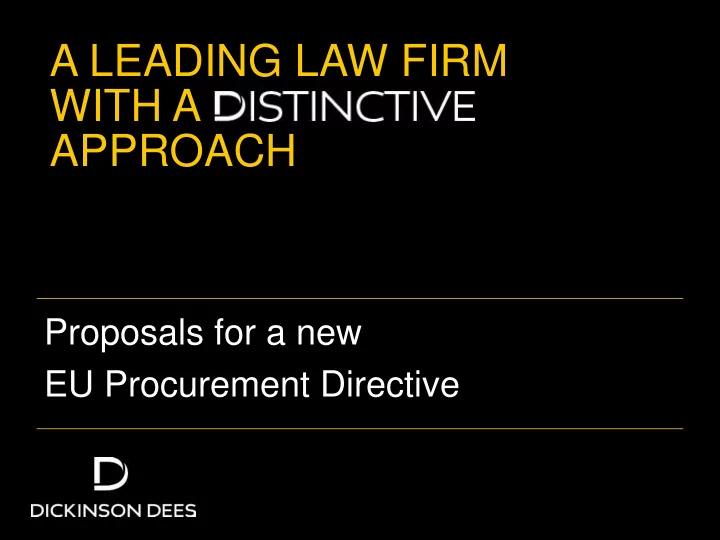

A LEADING LAW FIRM WITH A APPROACH Proposals for a new EU Procurement Directive
Introduction • 20 December 2011 - Commission publish modernisation proposals for three sets of directives: public sector, utilities and concessions • If adopted the new directive will replace the current public sector directive (2004/18/EC) in its entirety • Only proposals and been debated during early 2012 – revised compromise text published 24 July • Already some changes made and more to come • Commission hope to adopt by end of this year/early 2013 and then give member states 18 months to implement the new directives into national law • Cabinet Office consultation period pre-UK implementation • Latest position set out in Cabinet Office PPN of 24 August 2012
Key Objectives • Key objectives – increase the efficiency of public spending via simplification/ “flexibilisation” of rules – improve the access of SME’s to public sector contracts – facilitate the strategic use of procurement to promote societal goals (such as environmental and social issues) – combat favouritism, corruption and conflicts of interest – clarify basic principles and concepts to ensure legal certainty and take opportunity to incorporate well established case law into the legislation • Mainly going to look at issues relating to the first two points
Efficiency- Procedures • Grounds for choosing competitive dialogue and competitive negotiated procedures will be harmonised and less restrictive (with much freer access to competitive negotiated) • Some of grounds look relatively familiar but some very broad and not that clear • Alterations to final stages of the CD process: - – once selected winner can do more than clarify and confirm: “where necessary, in order to finalise financial commitments or other terms of the contract, the [CA] may negotiate the final terms of the contract with the tenderer identified as having submitted the [MEAT]”. Subject to general EU Treaty Principles • Both now look very similar – what’s the difference?!
Efficiency - Streamlining • Timescales reduced in overall terms but more rules around ability to reduce further where used a PIN (but specific requirements apply) • New clarificatory provisions around centralised procurement (CPB, frameworks etc), e-procurement and joint procurement (now expressly covered) • Little change on framework agreements themselves – do now envisage allowing both direct award and mini-competition rather than one or the other • New simplified provisions on DPS
Efficiency – Services Categorisation • Part A and B services distinction scrapped • General Treaty Principles apply to Part B services contracts where cross-border interest but courts have been limiting application of these in this area • All Part B contracts become Part A contracts except “social and other services to the person” but position not yet finalised (indicative list in current draft text) • These services, above certain thresholds ( € 500,000), will require advertising but thereafter rules probably based on general Treaty Principles and for member states to decide on
SME Access - Lots • Rules on “lots” to try and assist SMEs where appropriate • Proposal is that for certain procurements the CA to consider division into lots or explain why it has not done so • CA’s can limit the amount of lots that one contractor can bid for (this is possible now) or limit the number of lots one contractor may win (new) provided the objective rules for this are set out in advance • Allows for combining of lots where same tenderer wins
SME Access – Shortlisting • New provisions on shortlisting (new exclusion grounds) and minimum turnover thresholds • If CA wants to impose a minimum turnover threshold it cannot be more than 3 x the value of the contract unless there are “special risks” attached to the nature of the works, services or supplies. Test can be applied to total turnover or turnover in the goods which are the subject of the contract • Consider previous (bad) experience of a contractor and reject at PQQ where it has shown significant or persistent deficiencies in the performance of any substantive requirements under a previous contract or contracts of a similar nature with the same CA
SME Access - Documentation • Trying to deal with levels of documentation required to bid, particularly PQQ – concept of “self declarations” • PQQs can still be used but CA’s must “trust” answers. CA can ask for supporting evidence during procedure and must ask once identified winner (but then only from the winner) • Use of a “European Procurement Passport” to satisfy evidential request suggested but dropped although still references other “databases”
SME Access – Award Stage • Recognises experience of proposed team can be a key advantage for SMEs • Explicit statement that “organisation, qualifications and experience of staff assigned to performing the contract” can be an award criterion for MEAT
Other Key Changes/Issues • New/expanded definitions (such as “procurement”, “bodies governed by public law”, “public works contract”) • Incorporating Teckal (in-house) and Hamburg (public to public) exemptions • Express provisions on what is or isn’t a “material change” to an existing contract ( Pressetex t case) • Provisions relating to pre-procurement phase • Use of “life cycle” costing as part of MEAT • Temporary exclusion for “mutuals” (UK lobbying) • Thresholds not changing much but UK pushing to review the levels of these as soon as possible
Thank You Neil Walker Director 0191 279 9364 neil.walker@dickinson-dees.com
Recommend
More recommend